

Huge MIT Study of ‘Fake News’: Falsehoods Win on Twitter. Ultimately, they found about 126,000 tweets, which, together, had been retweeted more than 4.5 million times.
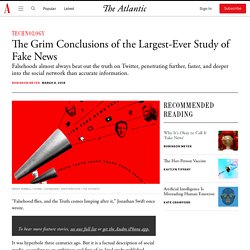
Some linked to “fake” stories hosted on other websites. Some started rumors themselves, either in the text of a tweet or in an attached image. (The team used a special program that could search for words contained within static tweet images.) And some contained true information or linked to it elsewhere. Verify: Was there a blackout in DC during protests? Is there any evidence that the government 'jammed' protesters' phones, stopping them from making calls or posting online?
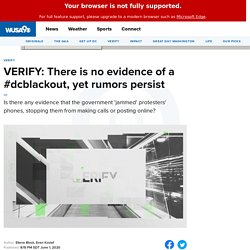
Is there any evidence that the government jammed protesters' phones, stopping them from making calls or protesting online? There is no evidence of this. Peter Newsham- Chief of Police- Metropolitan Police Department Metropolitan Police Department spokesperson Black Lives Matter DC Twitter During the third night of demonstrations near the White House, an online rumor claiming that protesters were unable to get cell service or upload content on social media went viral. Inside the Bizarre Misinformation Campaign About a Hoax Blackout in DC. Demonstrators in Washington, DC on Sunday.Photo by Alex Wong/Getty Images For indispensable reporting on the coronavirus crisis and more, subscribe to Mother Jones' newsletters.
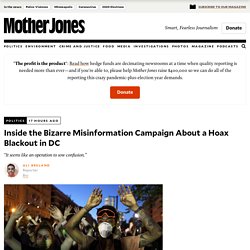
In the late hours of Sunday and early Monday morning, as Washington, DC, was in the throes of massive protests and police used teargas, rubber bullets, and what appeared to be flashbangs on demonstrators drawn out by the death of George Floyd, something confusing started happening online: the hashtag #DCBlackout started going viral on Twitter, accompanied by similar posts on Facebook and Reddit, claiming that sometime at around 1 am, internet service had gone down throughout the district, blocking people from using the internet or posting what was happening on social media. There is almost no evidence that suggests that this actually happened. Fact-checking resources - Fake News - LibGuides at University of Massachusetts Amherst. Media Bias/Fact Check - Search and Learn the Bias of News Media.
Discussing the Impacts of Social Media Algorithms. Introduction When Facebook acquired Instagram in 2012, many people were confused by the purchase.
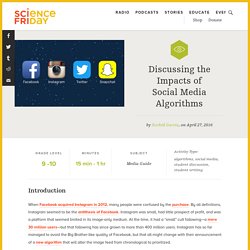
E.S.C.A.P.E. Junk News. How to Use the Vaping and Juuling Trend to Teach Media Literacy. Clinton Received Debate Questions Week Before Debate. On 26 September 2016, Democratic presidential nominee Hillary Clinton and Republican presidential nominee Donald Trump squared off at Hofstra University for the first head-to-head presidential debate of the campaign.
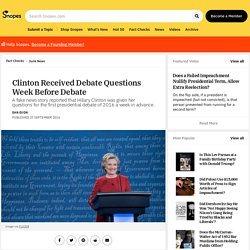
One of the talking points that emerged from the debate was the preparedness of each candidate, exemplified by this line from Clinton in response to a remark by Trump about her recent absence from the campaign trail: “I think Donald just criticized me for preparing for this debate. Solar Panels Drain the Sun's Energy, Experts Say. (AP Photo/Toby Talbot) <National Report>This week, a scientific research facility in Wyoming made a startling discovery that is certain to change the way millions of Americans look at the environmentalism movement, after they found conclusive evidence that solar panels not only convert the sun’s energy into usable energy, but that they are also draining the sun of its own energy, possibly with catastrophic consequences far worse than global warming.
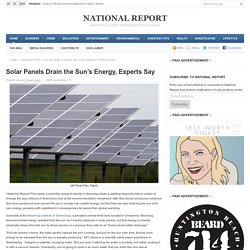
Scientists at the Wyoming Institute of Technology, a privately-owned think tank located in Cheyenne, Wyoming, discovered that energy radiated from the sun isn’t merely captured in solar panels, but that energy is directly physically drawn from the sun by those panels, in a process they refer to as “forced photovoltaic drainage.”
WIT is adamant that there’s no immediate danger, however. “Currently, solar panels are an energy niche, and do not pose a serious risk to the sun. Matt Rock. Top 3 Videos for Making Sense of Media Literacy. Media Literacy Week is Oct. 21-25.
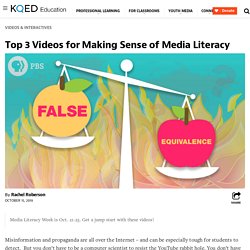
Get a jump start with these videos! Misinformation and propaganda are all over the Internet – and can be especially tough for students to detect. But you don’t have to be a computer scientist to resist the YouTube rabbit hole. You don’t have to be a seasoned reporter to avoid the trap of false equivalence. And you don’t have to be a psychologist to figure out how personal bias affects the way we respond to the news. Help students make sense of these critical topics with these featured videos created by KQED and PBS Digital Studios.
(123) Navigating Digital Information. John Green launches Crash Course: Navigating Digital Information. On behalf of my library/educator colleagues, thank you, John Green.
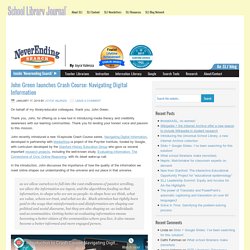
Thank you, John, for offering us a new tool in introducing media literacy and credibility awareness with our learning communities. Thank you for lending your honest voice and passion to this mission. John recently introduced a new 10-episode Crash Course series, Navigating Digital Information, developed in partnership with MediaWise–a project of the Poynter Institute, funded by Google, with curriculum developed by the Stanford History Education Group who gave us several important research projects, including the well-known study, Evaluating Information: The Cornerstone of Civic Online Reasoning, with its bleak wake-up call. - Resource Library.